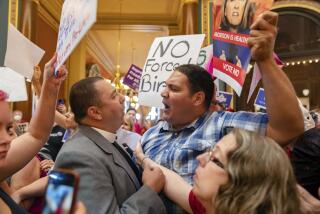Court Lets Stand 24-Hour Abortion Wait : Appeals: Suit against Mississippi law is not reopened. In another case, justices decline to back military’s ban on gays.
- Share via
WASHINGTON — In a setback for abortion-rights attorneys, the Supreme Court on Monday refused to reopen a lawsuit challenging a Mississippi law that requires a doctor to offer a woman counseling on alternatives to abortion and then wait 24 hours before performing the procedure.
Without comment or dissent, the justices dismissed an appeal from lawyers who contended that the Mississippi law puts “an undue burden” on poor women who must travel as much as 100 miles to obtain an abortion.
Meanwhile, the justices also refused to reaffirm the military’s ban on gays in the ranks, apparently leaving the issue to be resolved by President-elect Bill Clinton, who has pledged to end the ban.
The action in the Mississippi abortion case suggests that the justices will take a hands-off approach as states seek to impose limited regulations on the practice. For abortion-rights lawyers, it also means that they may be forced to challenge laws based on how they work in practice, rather than seek court orders blocking the laws before they take effect.
Leaders of the abortion-rights movement denounced the decision, saying that it may take years to prove in court that such laws pose undue hardship on women, especially the poor.
“This makes the ‘undue burden’ standard into a hollow promise,” said Rachael N. Pine, an attorney for the Center for Reproductive Law and Policy who represented the Mississippi doctors challenging the new law. “By allowing that (law) to stand, the Supreme Court has turned its back on Mississippi women . . . and has jeopardized the lives and health of women throughout the nation.”
But anti-abortion movement leaders said the court’s action merely reaffirms its view that pregnant women can be asked to think twice before undergoing an abortion.
“Abortion advocates are truly for abortion on demand, because they oppose even a 24-hour waiting period and a woman’s right to know before a life or death decision such as abortion,” said Wanda Franz, president of the National Right to Life Committee.
In June, the justices on a 5-4 vote reaffirmed the principle that women have a right to choose abortion but they also said that states may regulate the practice, so long as they do not put an “undue burden” on women.
The ruling means that states may not “place a substantial obstacle in the path of a woman seeking an abortion of a non-viable fetus,” said Justice Sandra Day O’Connor.
In the June case, Planned Parenthood vs. Casey, the majority specifically upheld Pennsylvania’s so-called “informed consent” rules for abortion doctors.
As such, these physicians must meet with a pregnant patient and offer her information on the age of her fetus and on alternatives such as adoption. After 24 hours, the doctor can then perform an abortion at the patient’s behest.
In August, the U.S. 5th Circuit Court of Appeals in New Orleans ruled that Mississippi’s abortion regulations were “substantially identical” to those upheld in Pennsylvania. Therefore, the judges dismissed a “facial challenge” to the law and allowed it to go in effect.
In their appeal to the high court, lawyers for the Mississippi abortion doctors said that, before the law takes effect, a judge should be required to conduct a trial and examine evidence on its likely impact.
Only two of Mississippi’s counties have abortion clinics, they said, and poor women are unfairly burdened by the requirement to take two days to get an abortion. These women deserve “their day in court” before such a burdensome regulation takes effort, they said.
But the justices dismissed the appeal (Barnes vs. Moore, 92-588).
“That means we will have to make a record over several years of how these constitutional rights were violated,” said Pine.
Meanwhile, in the gay-rights case, the justices let stand a ruling requiring the U.S. Army to offer a “rational basis” for its decision to discharge Capt. Carolyn (Dusty) Pruitt, an acknowledged lesbian.
In a Jan. 27, 1983, article in The Times, Pruitt said that she is a homosexual but nonetheless planned to continue her military career. Based on that admission alone, the Army sought her discharge.
In May, however, the U.S. 9th Circuit Court of Appeals ruled that the Army had not justified its decision in Pruitt’s case. It remanded the case for a further hearing.
But Bush Administration attorneys said that this ruling amounted to “unwarranted interference” in military affairs and they asked the high court to overturn it. Instead, the court took the somewhat unusual step in the case (Cheney vs. Pruitt, 92-389) of simply refusing to hear the government’s appeal.
“I think the court has recognized that the military policy is about to change and they will let the political process work,” said Jon Davidson, an American Civil Liberties Union lawyer in Los Angeles, who represented Pruitt.
More to Read
Get the L.A. Times Politics newsletter
Deeply reported insights into legislation, politics and policy from Sacramento, Washington and beyond. In your inbox twice per week.
You may occasionally receive promotional content from the Los Angeles Times.











